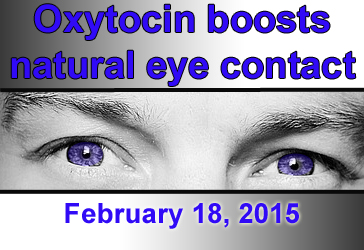Check out other stories from the Latest News
Oxytocin Improves Eye Contact
By Sharmila Banerjee-Basu, Ph.D. on February 18, 2015

Background: Oxytocin is a hormone produced in the brain with diverse physiological functions: labor contractions during childbirth, lactation, and sexual intimacy. More recently, scientists have examined oxytocin’s role in mediating social behaviors across mammalian species, including human. At present, oxytocin is an attractive pharmaceutical candidate for disorders of social cognition such as autism spectrum disorder (ASD).
What’s new: In a study published online, February 10, 2015, in the journal Molecular Psychiatry, scientists at University of Cambridge, UK, reported the effect of oxytocin in improving eye contact in a real-word social situation in adults with autism. The researchers administered an intranasal spray consisting of either oxytocin or placebo (same formulation without oxytocin), in a double-blinded manner, to 32 adult males with ASD and 34 neurotypical control participants. A novel test for social interaction – recording eye movements in a naturalistic setting – indicated that oxytocin significantly improved eye contact in both the ASD and control population. Importantly, oxytocin had a greater effect on looking time in ASD individuals with poor eye contact than in the placebo condition.
Why it’s important: Ongoing clinical trials are testing if therapeutic oxytocin can alleviate social cognition difficulties in children and young adults with ASD. This is the first study to show improvement of a core behavioral component of autism: eye contact in a social situation.
Help me understand :
| Source(s) : |
| Tweet |

